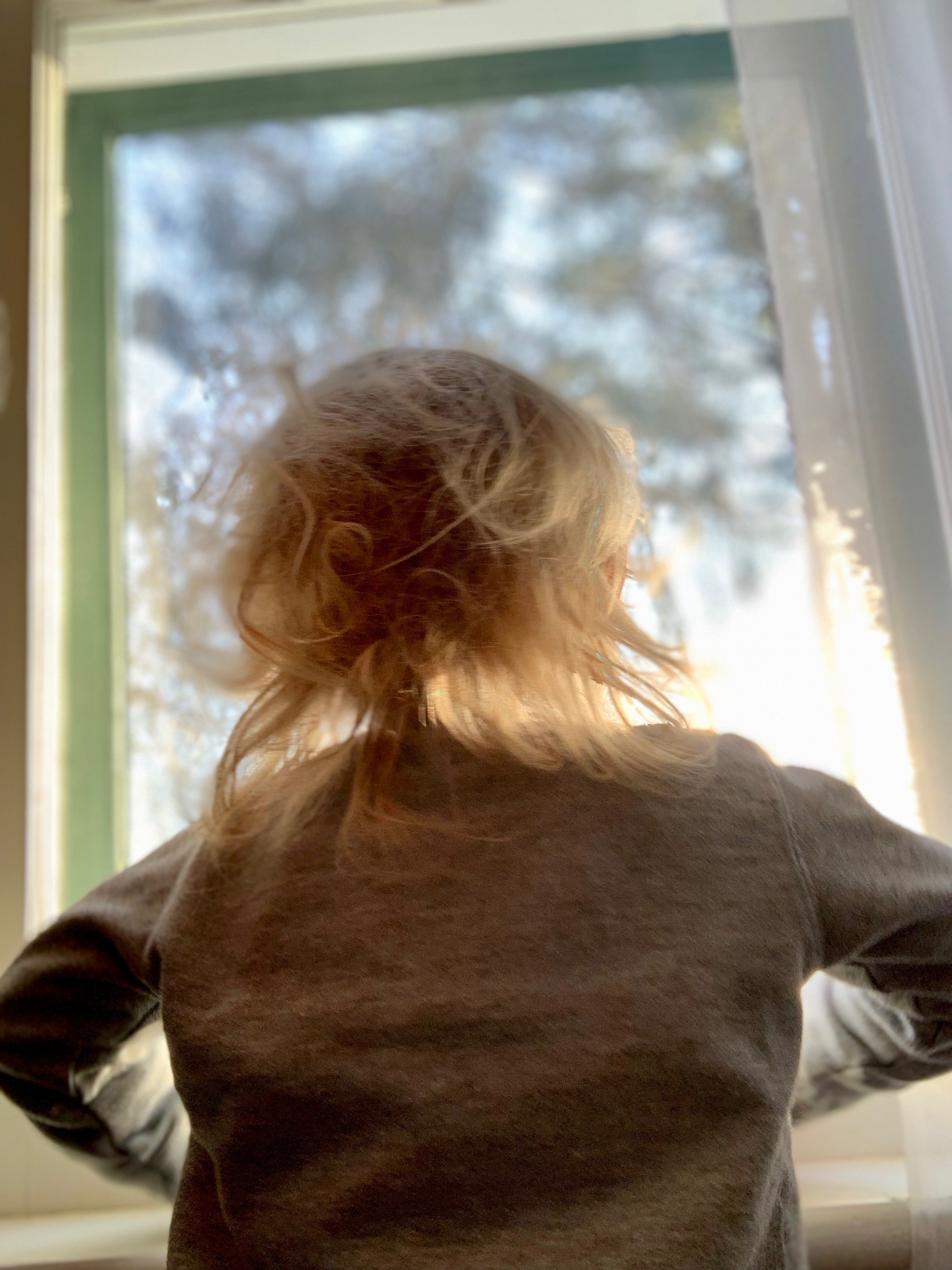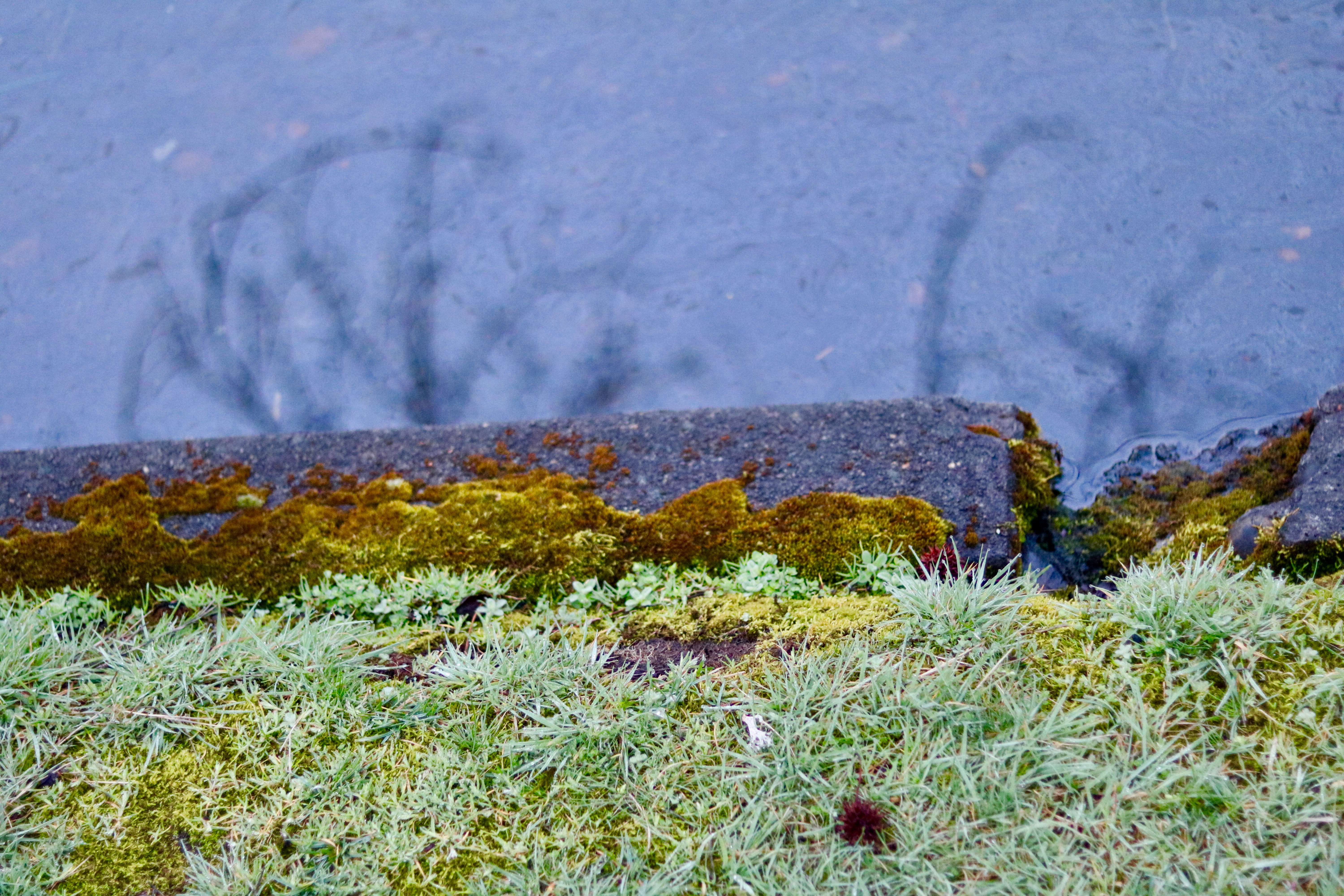
Of all the steps I have taken, these remain with light, or white, that is, though at times a fierce green is permitted in my memory of where my childhood lawn died and the tall dry reeds crackled, all the way down to a creek. Now memory places that creek in black and white and I’m under the country road bridge where fishermen filled buckets of crappie and sunfish and teens smoked menthols in the arch where the cement beams planked the rumbling road above; to be beneath, to sleek, to reel. Many times I followed the shores of the creek to where it either trickled into tinctures of a disappearance, or back the other way, to where it flowed wide into a lake and under a bridge again (a highway, always) to another slinking creek then through old marshes and we’d pass the hissing geese and stop to tie our canoe up near the water and we walked past what we were told was an Indian burial ground to a slope and, at the top, where the state built a rest area, we’d buy candy bars from the vending machine. Each action a part of the colonial residuum.
Other green things line up in my mind: the belly of a catfish, caked in algae before it grunts jaundice and is thwacked onto the bridge by boys grown bored in June. Then too the arms of the old snapping turtle, camouflaged until its neck is snagged by hooks and unpeeled for stew. So too the first puff of dope (a nug) in a joint rolled with notebook paper and coffee beans. Green glass of sparkling water and green glass of the attic window and green grass in a chance of blue July and green sludge behind the hidden fort and midnight green storms of August and when the creek had to be drained, how green our lost treasures became against the rust and the thousands of drowned fish sounding out their blurts like muffled tin cans, sinking, how green.
At first, I sunk my small legs in a swamp and years later I took the steps down to where I knew everybody loses their minds. Everything can be found in a dance. To go underground until you can round yourself out with strangers. To arise from that. This is grass. This is why cities can city. Can sit. I have seen grass grow out of the saddest room, five bodies bruised by nostalgia for the 1990’s. When the bar closes down, the blades of grass whistle our throats home and heap us. To wake up near that fire escape, that siren, and get through a day—much like a creek giving up right before it lakes.
He blades strangers, the underground of legs
stand, muffled in nightly green. Who knows
the first hook bores the mind? The private
vending slope passes a creek to disappear
above cement. The road circles green with light.
***
When we pose to be taken in by a lens, what are we composed of? What must we dispose of in order to be ordered? I will always recall the first time I saw a child run to a camera to see how they had (or would be) seen. In our time, it was either the patience of development or just forgetfulness. To be captured and saved for later, gone still or negative. My first memory of light comes from snow opening itself through a gray hole of noon. And then the hole in the ice that I could not see while ice skating, the hole that consumed me the lengthiest smallness of time. Sometimes I wake up in the echo of that submergence. Other times I am carried in a layered halo toward an imperfect hour.
The moose swam right in front of our canoe with its calf on its back. When it arrived at the shore, it dropped off the calf, got back in the water, and swam toward us. My father told us to paddle faster and I looked back to where the moose stood tall, antlers jutting out and up, and I’ve always wanted to be invited back to that emergence. Now our son is terrified of moose but he has only seen them in books. When I tell him that a moose will not be able to duck its head and get inside our house, he starts picturing moose bending and coming inside our home. I tell him they don’t live in these parts. “No, daddy,” he says, “the moose is here.”
Lately, when our son wakes up from a nap, he is inconsolable. The dregs. Other times he wakes up in the middle of a question—Where’d green go? —and I know I’m not alone in living the best of my narratives in dreams. Today I ran with snowflakes in the woods. I followed what looked to be a trail made by man but soon found myself inside the deer-slip. With a hood on, I could not follow the wind but my calves felt part of the cold breeze. The trail thinned and I jumped over a felled tree. When the trail opened into a park, I ran toward a long dash of ice and slid across the edge of the barely frozen pond.
The sound of himself:
pond opening ice. The cold
slips him, middles the waking.
Geography rooms a house,
ducks into emergency stance.
Water, right in front of time,
echoing through itself. The
negative develops order
then disposes it.
***
When you become close enough to your family to speak of the taut, befallen truths—or when families only seem true because of the taut and befallen—there is nothing richer than lineage. Suddenly the photograph of a grandfather’s buttons or a grandmother’s bob means you’ve come from all the minutes of your dead. Of my progenitors, I am somewhere between their inherited guilt and their idiosyncratic Americanism. When I lift a book, for instance, I am often my grandmother—a daughter of the American Revolution—in the middle of a cigarette at the tail end of a romance novel near the door of our four-season porch. Other times I am my grandfather’s laugh, itself a forgiveness for what was lost in growing up without the most essential truths.
Of the things that surprise us, so few of them are internal or local. We come home with news and gossip as suddenness and infancy, but rarely are we turned over by what is not, at least in what we know is. I carry so many cartridges of myself that I feel even my wife does not see or know just who I am. Just who I am. Do these thus disappear, get expelled elsewhere, die in the sweat of a run? It is not that I keep sides of myself away, only that in flashes of who I am, I know too that I am not. Like being in a crowd and suddenly a microphone sneaks into your hand and you are asked by the grandstand to answer the question, what’s your story?
Sometimes we see ourselves being seen—in windows, mirrors, puddles—and there is no otherness to save us. We remain diffidently ourselves, too much us.
One of the joys of living near water is that you can often feel yourself being taken away, even if briefly, from all the stillness. Or taken, swiftly, into away.
When there is snow in the morning and you have not expected it, it is less a trick, more of an offering. All this loose death, this blanketing brevity. I want to get so lost in it that all I will be able to do is be found, then split back up, directly into green, and be.
I have spent the day with our son. I take him to a gingerbread gallery at the Eerie Canal Museum and then we stand inside a model ship. He says hello to the mannequin woman and man in the front hull, mock-ups of travelers in sleeping quarters. Afterwards, we walk to a giant Christmas tree and he says, “Hey, there’s baby Jeeze,” while pointing at the nativity scene. We stop to get a plain bagel with cream cheese. Then onto a vitamin store to get some DHEA. Now I see how quickly our son is slung through history, holiday, hearth, and hope. As we build a barn fence with magnet tiles by the fire, I can tell he has unknown questions festering. He smiles at me before launching a block at the woodstove.
Before the fence,
history stores
the scenes in sleep.
A model gallery,
death, this
morning of
remaining at
windows.
***
The fire is popping and splattering. We have gone through so many doors but rarely have we stood within them and kept check on all the exits and entrances of time. This is why city streets remain so fashionable. They are full of leavings, erased by goings and comings. So too the holding forth of oneself in the wind, that it will actually care enough to allow us a way out of it.
How do we measure the size of what we need? Mostly, and as need dots an absence, we are content with portions small enough to swallow. Mouth and eye. I dispense with such slant. I abused words for so long because my body was small. As my body grew, definitions changed.
Look at the end of us when the streets change access. I put more logs on, put our son to bed, and wake up in another year. I promise not to pretend anything that isn’t okay is. I will not announce the pain and frailty either, no, but I will not deny words if summoned by inquiry. We are meant to mean much more than meaning.
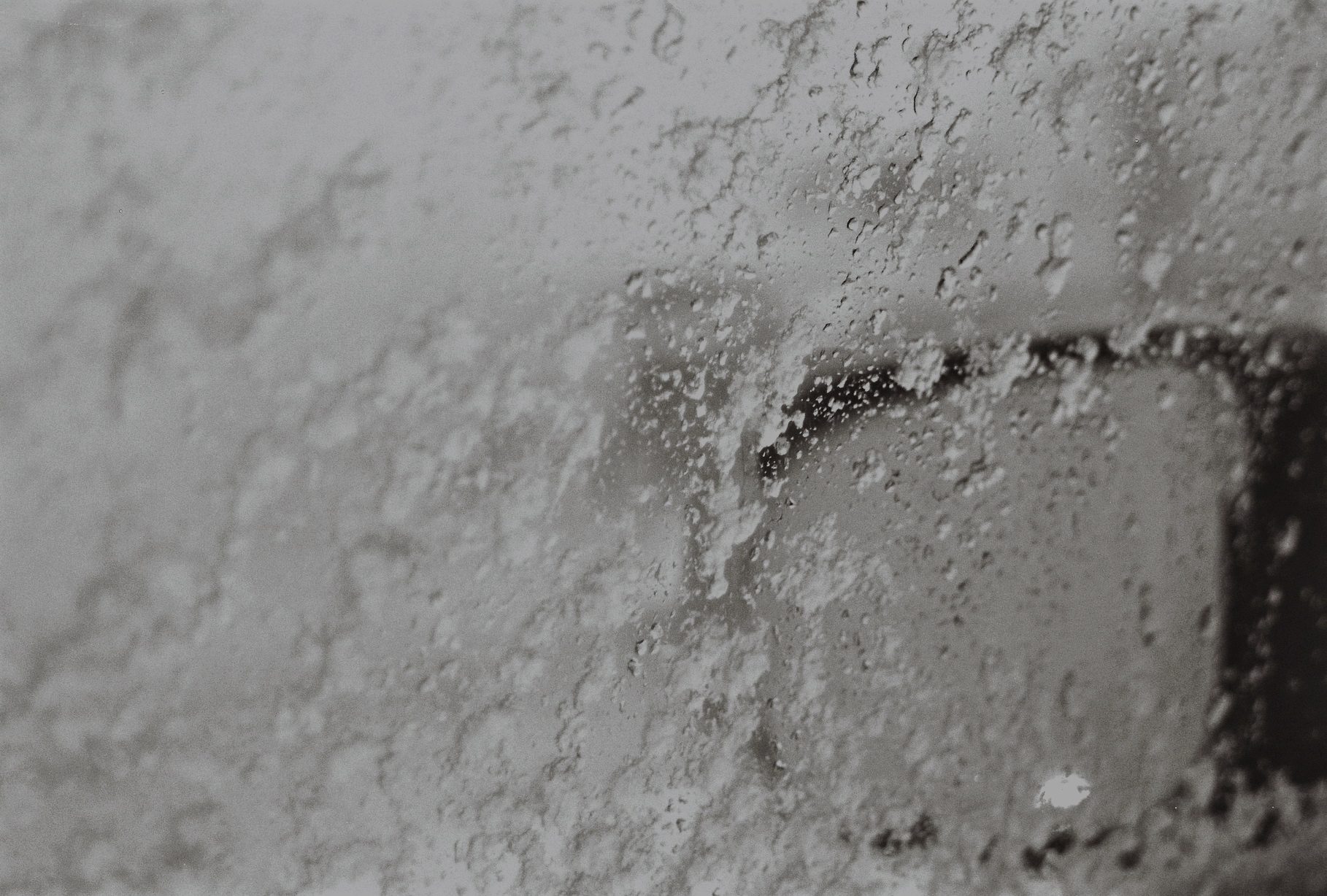
He means to announce
another change. The body
is enough absence to walk
in new wind and leave behind
time. So many laughs to return.
Belief within the
breaking secrets.
***
Mirrors must face themselves. The year has turned and the list of things I have done today leads me to believe to believe. I take the bulbs down from the fence and watch frost peel the wooden slats into a darker trance of guarding. The wind draws its dress up and throws its bones out. My wife sees it as 2018 holding on, or 2020 starting strong—so many reasons to see the signs in things, the sense in hinge. Branches are all over the street.
All that the chairs are doing to hold our weight. That we’ve sat in so many that they could be remanufactured as history. I look at another photograph with no people in it and yet that is all that I can sense, that someone has been here, even if they’re never coming back.
He prepares two
potatoes, toast,
and an apple.
Someone historicizes
the weight of
the telling. That
theory signifies
nearness to
preparation. Ahead
feels miles away.
The street holds
guard, wood
right in its face.
***
I’m watching a video of the late poets James Wright and Louis Simpson read and discuss their poems with James Dickey, the moderator. I am blown away with how soul-scraped and weighty their work is. It seems they wrote with a sincerity that has been sucked out by purity. However, I also recognize that, and in speaking about America, they too were thinking of the days between themselves and Walt Whitman. We must renew ourselves on the daily.
***
I dream about not getting up early, as I’ve planned to do. Silent repercussions, like dark clouds, scuttle. I couldn’t seem to clarify what meant more to me—getting up and writing and running, or sleeping longer. The dreams woke me so many times that I arose in the dark to do as planned.
There are two anagrams I have forever found myself scrambling back to: 1) listen=silent; 2) routine=in route. Something about the silence of listening means that listening has to happen in silence in order for it to fully succeed. But whose silence?
The firewood separates into hundreds of charred blocks when it burns, so that even as the log is leaning, its old form crackling into white squares, it is reversing something, showing us that it comes from its parts. I think of high-rise buildings twinkling with distress, and that they all shade the same entrance. Bodies just leave in their own cursive pain.
The timing of
sunrise is entrance.
Buildings lean
quietly at being.
He gets silent:
listen. He finds
himself—sleeping
repercussion,
hereditary dip
of the worn tongue.
***
The photograph. We can follow it back at times, where our hands need to go. The reliability of the relatable. If I begin to speak about my son, for instance, and how he builds a castle again, then I have in my audience sons and fathers and mothers and daughters. If I tell you how he copied me when I got home from work by kissing my wife and then me and saying, “hi bears,” then I have in my audience bears, embracers, and love.
We see ourselves passed up by the past. As in, where is the mention of what we come from? What I enjoy the most about the film is twofold: 1) the main character simply lives (not lives simply, of course). She shows no signs of working any place forward or backward. She lives. 2) I was not ready to cry but could not help doing so when everyone embraces on the beach.
Upstairs, our son is screaming, fighting off his nap. I throw the Christmas tree on the street. I know he will ask me what I’ve done with it. As a parent, it is easier to put in more care in one month for your child than you have placed into your whole life for yourself. Having run early every morning this year, my back aches and research says this means my core or glutes are weak. I watch our son work hard to climb the stairs. I rest my hand on his lower back and he bounds ahead.
The pine needles from the tree are everywhere. In our hair and books and socks. The Norwegian Maple tree outside has streaks of thick moss embossed on it like decals. I see the young pastor out walking again. He looks forlorn, almost thrown into the forlorn. I often wish to speak with him but I fear the conversation will always end up being about faith, and I’ll feel as though I’m making up for something invisible.
Away is a kind of
faith. Streaks of need,
stairs aching all year
for care. He’s done
the tree struggle,
the jag of embrace.
No signs enjoy the past.
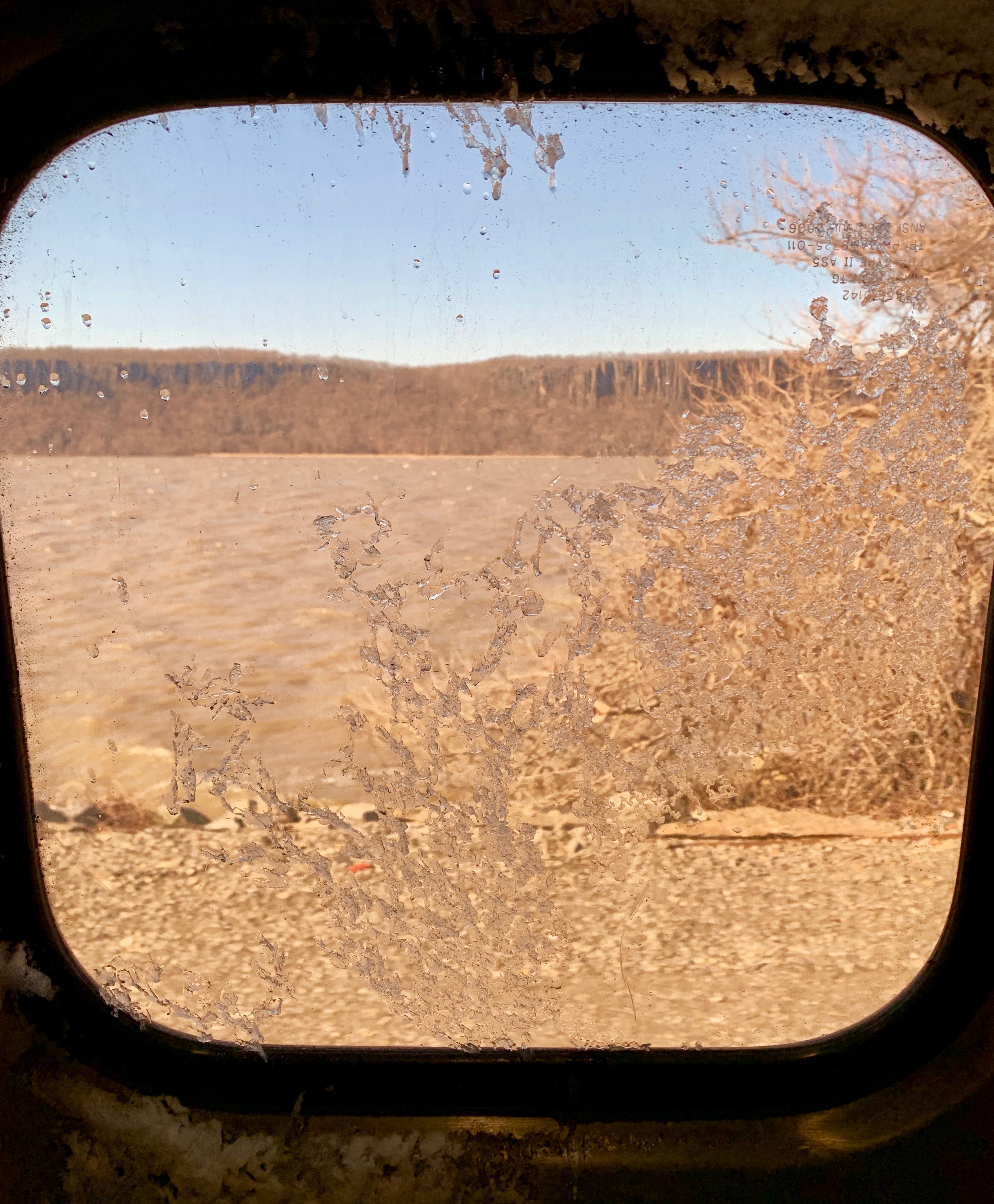
***
The sun, pink in its rise out of morning, pinking. Now it is blown orange before retreating behind clouds. Somewhere, the last clink of night allows this day to begin and I think of where light is stored when I wake in the darker hours, fighting my steps. In winter, the beaches and lakes are mostly left alone. Even the ocean seems on hiatus. We can oversee the silence from docks and piers but perhaps the best assumption is that a quieting occurs. Sometimes a body finds a floral pattern to sit and stand inside and goes all day without having to feel like a body making sense inside scenes, aside the seen. Clothing as capsule. Not disguise, but the container vessel of and for surviving what breathing makes of us.
I walk The Trail. It is cheek-flush cold. It is an old railway path that cuts alongside a creek. Yellow poplars and tall grey trees. I launch a large branch toward the ice. It punctures then sticks and remains standing, my part-time flag. The rocks gurgle and beep atop the surface of water, marsh, and stream. I hold a chestnut. The drumlins and small country barns sprawl out like knuckles and cartilage.
The knuckled surface
ices over. The launch
is path being hour is
returning. Breathing,
he’s inside an
assumed alone.
Stored to allow
the before some
coming after.
***
I return from work, put ski goggles on, and run in the darkness around a pond. There is one other runner whom I pass—we are going in opposite directions—twice, this double looping. Snow has just fallen and so there is very little sound at my feet. Each step is like a quiet pat on the back. I feel alive and released, but also parceled out into a quickly lit frame of time, slotted into the mileage— sent, part by part.
I put our son to bed and I can hear him constructing a narrative about farm animals and daycare. He made me sing a song before I put his blankets on— “our song, Daddy,”—and then he told me to keep the door open. Now he is taking turns spitting and singing. “You have to be quiet,” he says, “no I can talk,” he responds to himself, “I can talk.”
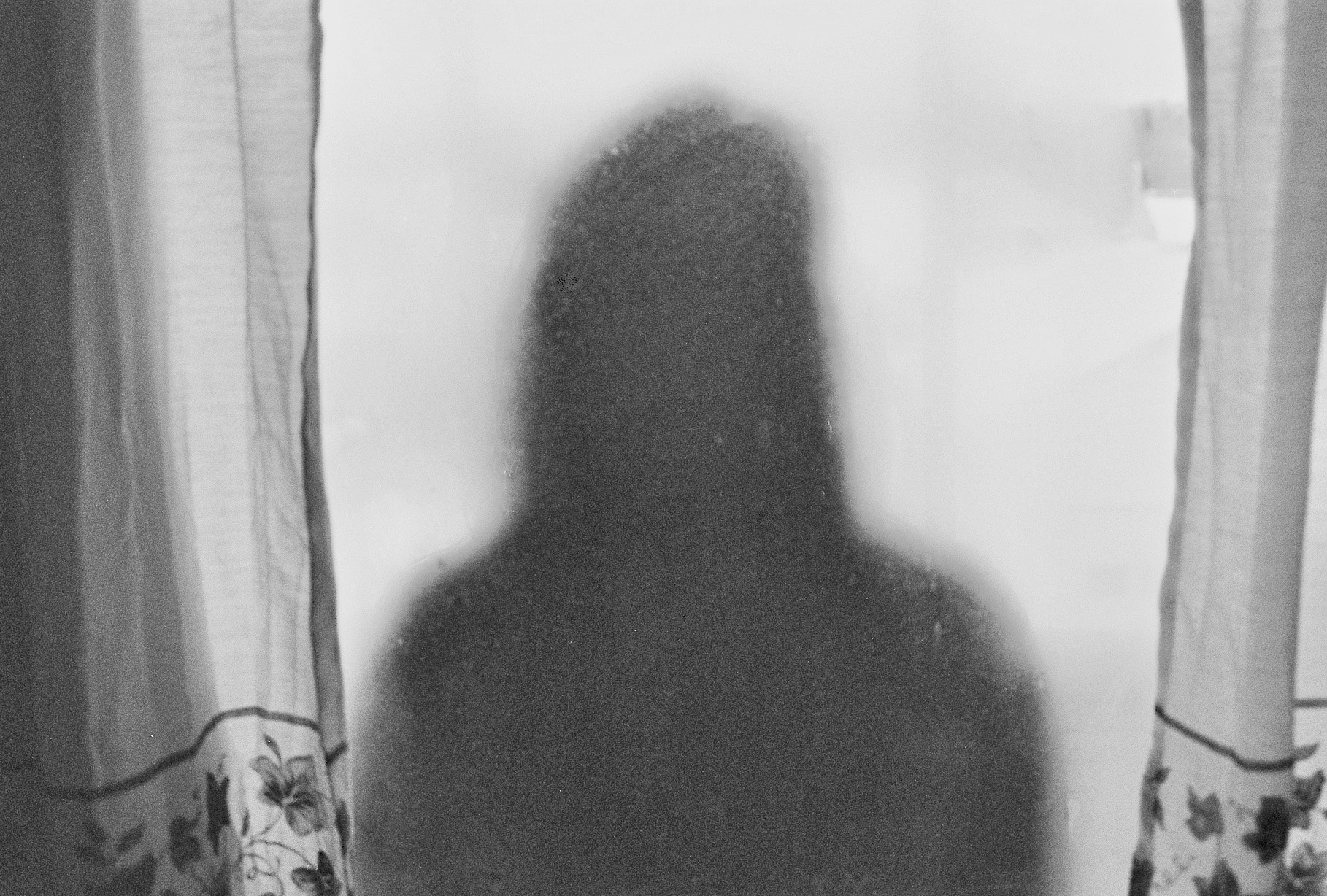
I have seen this picture before, the one in my mind or is it the woman in front of me? The fire keeps on with the teapot above the stove, groveling for clarity. Snow falls—perhaps a foot since last night—like decisions from the end of a day. I’ve been reading a lecture by Donald Hall and he’s talking about the difference between size and scale in poetry. Now I get it; I’ve said very little, but I know the wind in the chimney is more than a small day dying.
My wife and I have been trying to conceive a second child and we are failing. Fail is not the right word. Some element, some aspect of what is so naturally easy for others, is not working for us right now. I am not frustrated but I am pressed up against something. My fates. I have trouble seeing that just because science has evolved, we have to try things that, years ago, would not have been possible. There is size and scale.
Our house sits close to the street we live off. On nights like this, where I sit inside by the window and fire, the night walkers slip along our fence, not twenty yards away, like ghostly anthems.
A yard is where
science releases
family. Possibility
is pressed naturally
into failure. The
chimney scales
the night, clears
outside the picture.
***
Today is my father’s birthday. He turned 71, the same age his father (my grandfather) was when he had his second stroke and died. My grandfather is ancient in my mind, and seems to have been older than I ever thought he was. I remember his stack of National Geographic, riding on the back of his four-wheeler, and collecting golf balls with him in the woods. One summer I wore a t-shirt from the clothing company, Gotcha. My grandfather would reach out and grab me and say, gotcha! Sometimes I dream of him pulling me into death. Gotcha.
At the grocery store, I run into the recently ordained Lutheran chaplain. I wish to tell him I contain faiths. Our son yells the butcher’s name when he sees him, tells him about his Christmas kitchen. For five straight aisles, our son stays atop my shoulders, snug in his heavy poncho, which cloaks me for much of the shopping. I feel taller without having to be, and in knowing my son’s eyes are above mine, seeing out the things I cannot, restores in me the thanks I have for my own father, and for whenever he carried me before I even knew what it meant.
Even the father
cannot know
the son’s heavy
stay on seeing
into being. Animals
castle the heart,
reason staves off
death. He
accompanies the woods
into a stack
where the mind
turns the sameness
back and stars anew.
***
I drink a beer in the shower while our son plays on the shower floor with his toys. He fills a boat and tells me he is making me cinnamon kombucha. I take my time, hoping that my wife could use the space to read one of her books on myth and Celtic history. Maybe, in this time, she can divine enough to keep us all at bay.
I take our son to the Museum of Science and Technology. I climb a jungle fortress with him and he is terrified when a vacuous toy tube launches air out, mocking something interstellar. When he cries, I hold him atop a rolling cushion slide made of primary colors. We leave by flying down the spectrum, just below the spiraling galaxy.
Sometimes a face will wear a look that something that just happened should matter more; other times, less. I’ve been trying my face at the place where things matter just as they’ve been received, and then keeping it on. All the cranes have quit sulking for the day and hang over the emptied air.
***
Reflections everywhere. Peripheral impulse. As I close in on doors in winter light, and when I feel my image trammeled by passing cars, I know right away that we are equally taken in and away by day. I walk through the door and the building holds me, long after I leave it.
In the middle of ruminating about a war we do not know about, the writer brings us into our thoughts so that we are processing them alongside her. Then we can never catch up and the sentences win us over. Death becomes the life of not caring what’s next.
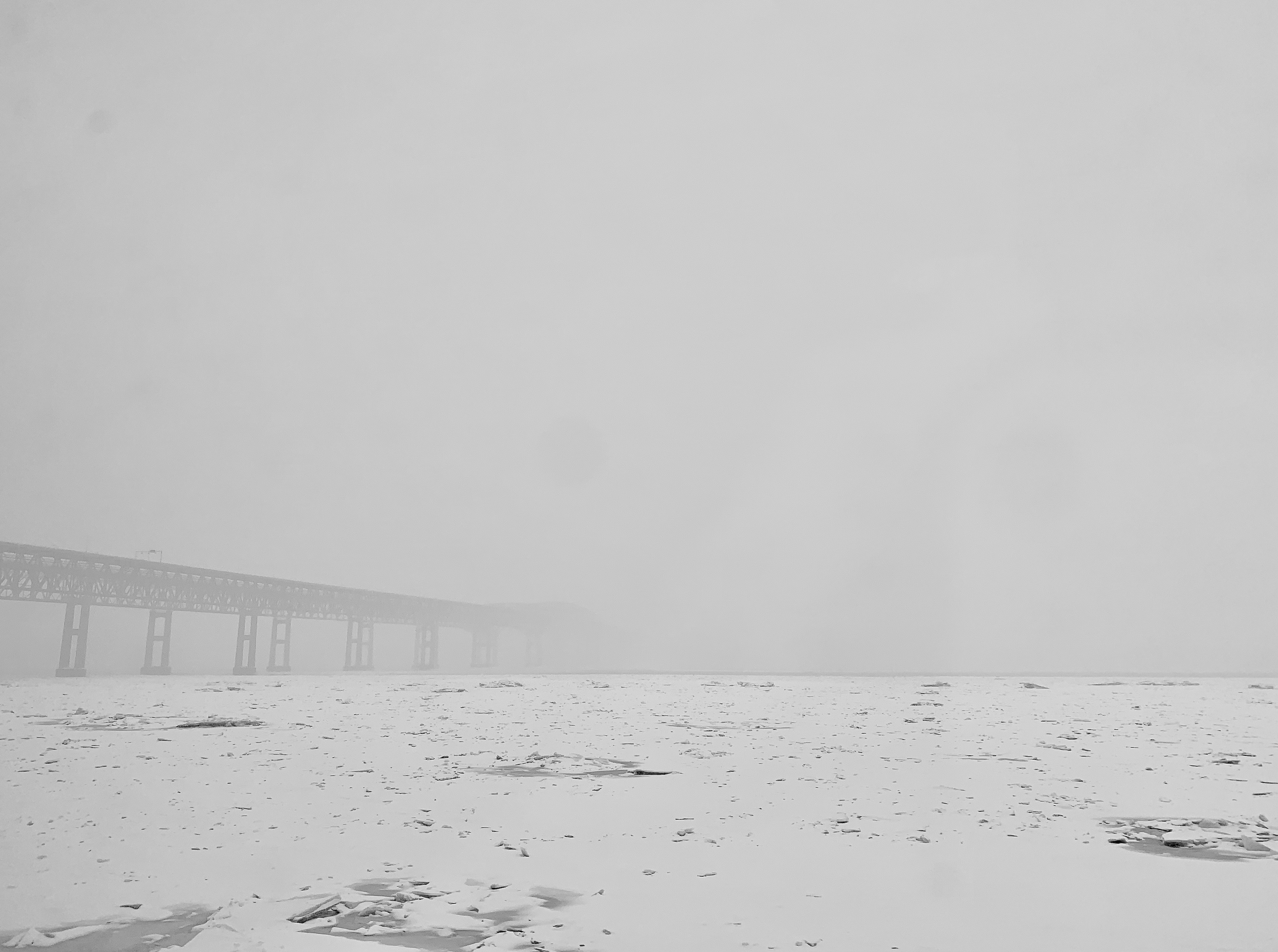
He’s beginning to
dance, to hear
where knowing
wins over thought.
About war, the
door passes
on impulse, aims
to close with fact.
The omission
is known to
sense something.
***
There are too many strangers I feel I know better than I know my friends. Myself. I blame photographs for this.
***
Today all the studium is going punctum. My wife has minor surgery at the exact moment I sit in front of fifteen students discussing the relevance of punctum in their writing: That a wound—even in just a detail—will save the whole order of the seeming and see for it style, carve the feeling back to cores. It is happenstance, to get down to the surgery room having just espoused Roland Barthes. The class speaks about Philip Lopate’s distinction between technique and psychology, that quite often what is in our way is not the unsharpened tools of a craft, but a reluctance to be exposed. I want students to see how their own quirks align them with higher registers of being. I ask them to write about where they are from (physically, yes, but philosophically, too), in one sentence; then how many siblings they have; then one word for a mother and father figure; then to finish the sentence, “one strange thing my family might tell you about me is that __________” and I walk right out of the room and down to the hospital.
***
In the planetarium, our son sits on my lap asking where the lights have gone. When the stars come, he asks where the man went, the man running the stars. I tell him about Orion, and then Orion as a butterfly, via the Navajo. He sits still for the whole show, amazed that the lion in the sky is named Leo. When we leave he says, “What’s wrong with Orion’s belly?”
I took three specific photographs of our son today. In one, his head is appearing in a play barn door. In another, he and I appear in a galaxy. In the third, we are smiling together in a pile of front yard snow. I remember what I felt I was capturing better than what I can see. Is this a way of saying photography just can’t cut it sometimes? Is it just the feeling of owning one’s sight we’re after?
Reach is not
following. The road
widens the night,
cuts memory
into a pile
of appearances.
His head pauses,
an edge of the
tree drums, a
flock snows the
hill. Hours of
the sky briefly
run the light.
***
Punctum, or that which Barthes says pricks him, is so often the random scratch in the polish. The wear within the veneer. I have an attachment to the scene of a family singing but only a passing attachment, a notice. But then how easily I am crushed by the way the youngest woman in the photograph can’t be seen (not singing) by her family.
***
I ask the students to either tell their stories by reading from them, or tell the story of telling their stories. The response is half and half. In heartbreaking softness, there are stories about absence, about memory and reunion, about broken instruments and dreams with heavy details, about the psychological displacement of shopping malls and stores and then everything each story seems to be about rewrites them each upon the hearing of them. There is the content and there is the way it is chosen to be shared. Everything springing between.
***
I wake up early to tend to our son. Though he is still tired, he wants me to hold him and so we lay down on the bean bag in his room. It is that non-time between 2 a.m. and whenever, where you become a waiting room body. He falls asleep fast but I cannot. I stare into the air.
I drive out to the park in the middle of a snow squall and run into the woods. The ground is pounded-down-hard and icy and I can barely see. Aside from a few snowshoers, all that I comes across are thick snowflakes until I happen upon hundreds, if not thousands, of geese, honking in drastic camaraderie around the open ceremony of water.
I keep coming back to the idea that with every surface my face has surfaced upon, I have stayed there and been carried onward, which is also away.
We have rearranged things in our bedroom so that we’re sleeping on different sides of the bed than we have before and there’s a mirror not far from being directly in front of me. Though I cannot see myself, I can see parts of myself when I sit up. Each leaves. The mirror is positioned in a way in which it catches all the light ghosts passing through the hallway in the night. I see them flicker.
***
In the beginning chapter of How To Talk About Books You Haven’t Read, Pierre Bayard quotes from Musil, in particular a scene from The Man Without Qualities where the librarian has not read any books, only books about books. So often I can see how much an idea that seems good is only as good as what it is in relation to, and then too, aren’t we always pressurizing the gaps?
Dinner date with my son. He eats watermelon, pizza, and chocolate milk. When I put him to bed he asks me to sing one of our songs, but without lyrics. “Do that one dad, not words.” Then he stops me and tells me he wants to sing it. He still has the hiccups. I turn him upside down and he laughs into a burp.
I keep thinking about how specificity and detail differ. Specificity seems to have an allegiance to the precision of a thing, to distinguishing the thingness, whereas detail, though often finely wrought, seems to always call out other details, or relate itself to the whole, and thus is less a oneness. Specificity can often work with the specifics. Detail can’t get by on its own. That I can’t write my wife into this frequency because I am honoring the space I believe she needs is a specific way to leave out many details.
Details keep leaving
to call out other
thoughts. He laughs
the songs out from
happening. They
happen anyway, gapping
the avoidance.
***
The night class I teach downtown is directly below a basketball court. At times, I am acutely aware (mostly when students are writing) of the variegated booms above me. I keep envisioning how all the forms of rhythm and dribbling above me are happening atop some surface, while we writers toil below, wishing to unearth something, contemplating the difference between voice and tone.
Trees in winter often look like they’re upside down.
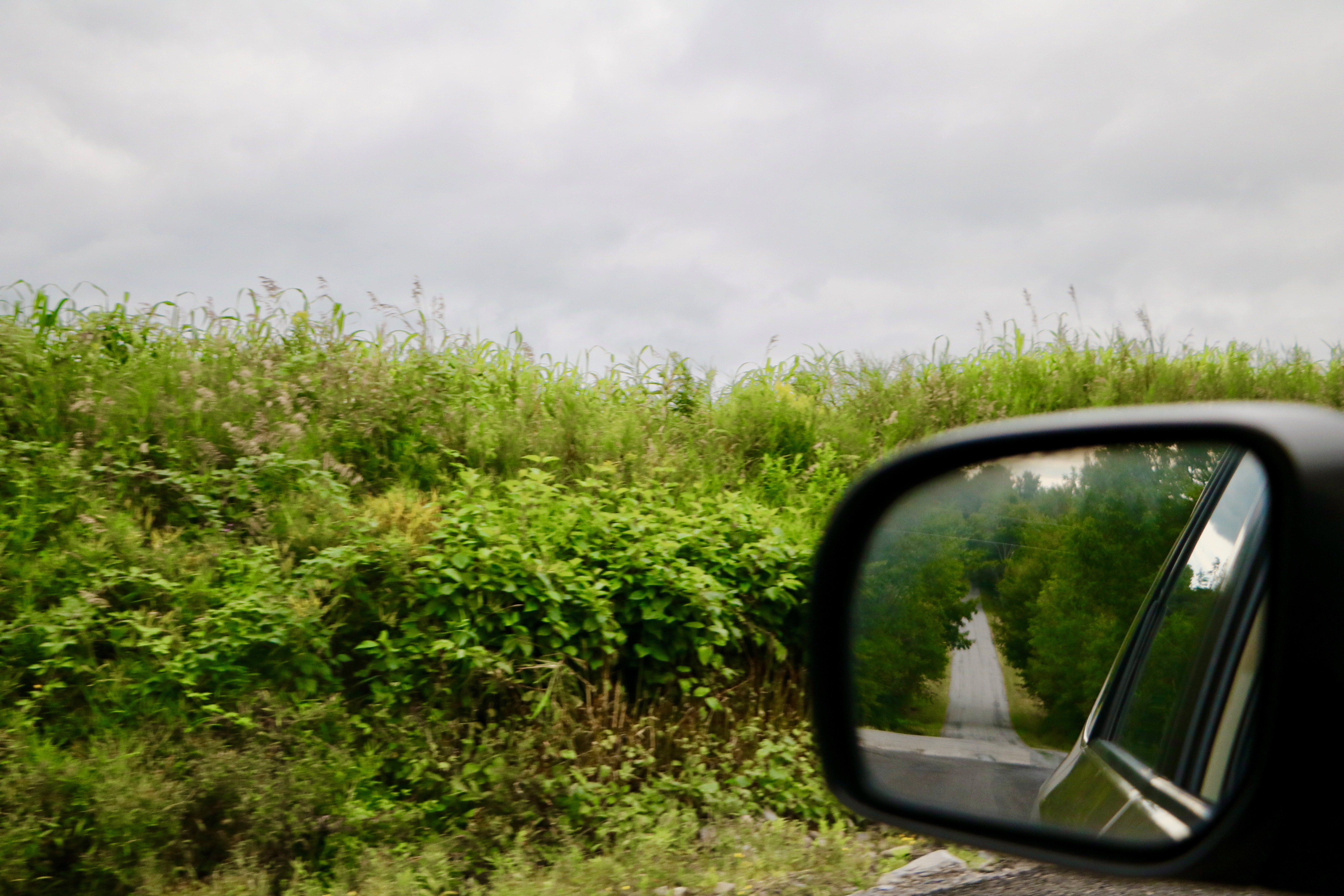
I tuck our son in and I can hear my wife breathing into a small snore next to me. I asked one of my classes today to write about what they might create a monument to in life and then I asked them to think of the scope of detail and experience when they write, to isolate each in how monuments arise. I thought about how senses embody experience and experience signals emotion and emotion triggers detail and then how, if you ask yourself why you’re recalling a certain detail, you get back to another experience, one that others can have at the same time.
Downtown sidewalks after midnight. Shadows gone straight like railings. Dozens of untouched raspberries. Forgotten cornices. These are the things coming to and then into my mind as I try it all again. Together. What I will do with them will never equate to what they’ve done with me enough to have appeared back here.
To have enough,
the things touch
shadows at the same
detail, a signal
to question the
smallest tree.
About loss, he teaches
between voice
and surfacing.
He keeps writing,
I am here.
***
Arrows on signs point to names and names hold towns and towns hold people and people are held by land. I am held by what my hand reaches for, and then even more by what it cannot. I hold our son I kiss my wife I continue the trying.
I speak to a scientist about things so minutely foreign to me that the importance of the trying crests into view faster and faster until I believe I know and understand exactly what’s behind their life’s work. I watch the speed of a low-blown cold become a sheet of nothing against the window. People keep saying “don’t go outside.”
Emotional truth, they call it, the way we can be even truer than a fact if we open our quirks up to an observation. I’m standing outside, watching my breath become encased in a sheet of white and away. Not even the reflections are happening.
How long does it take a statue to start feeling like it has been left out of, as opposed to in, time?
I can hear our son yelling I want to wake up in the room next door. My guess is that he wants to say he doesn’t want to go to sleep, but he’s thinking about the morning. He’s thinking about the moose. He’s thinking without knowing about thinking. He is starting to cry. I guess I must get up and walk one room over into his sound.
